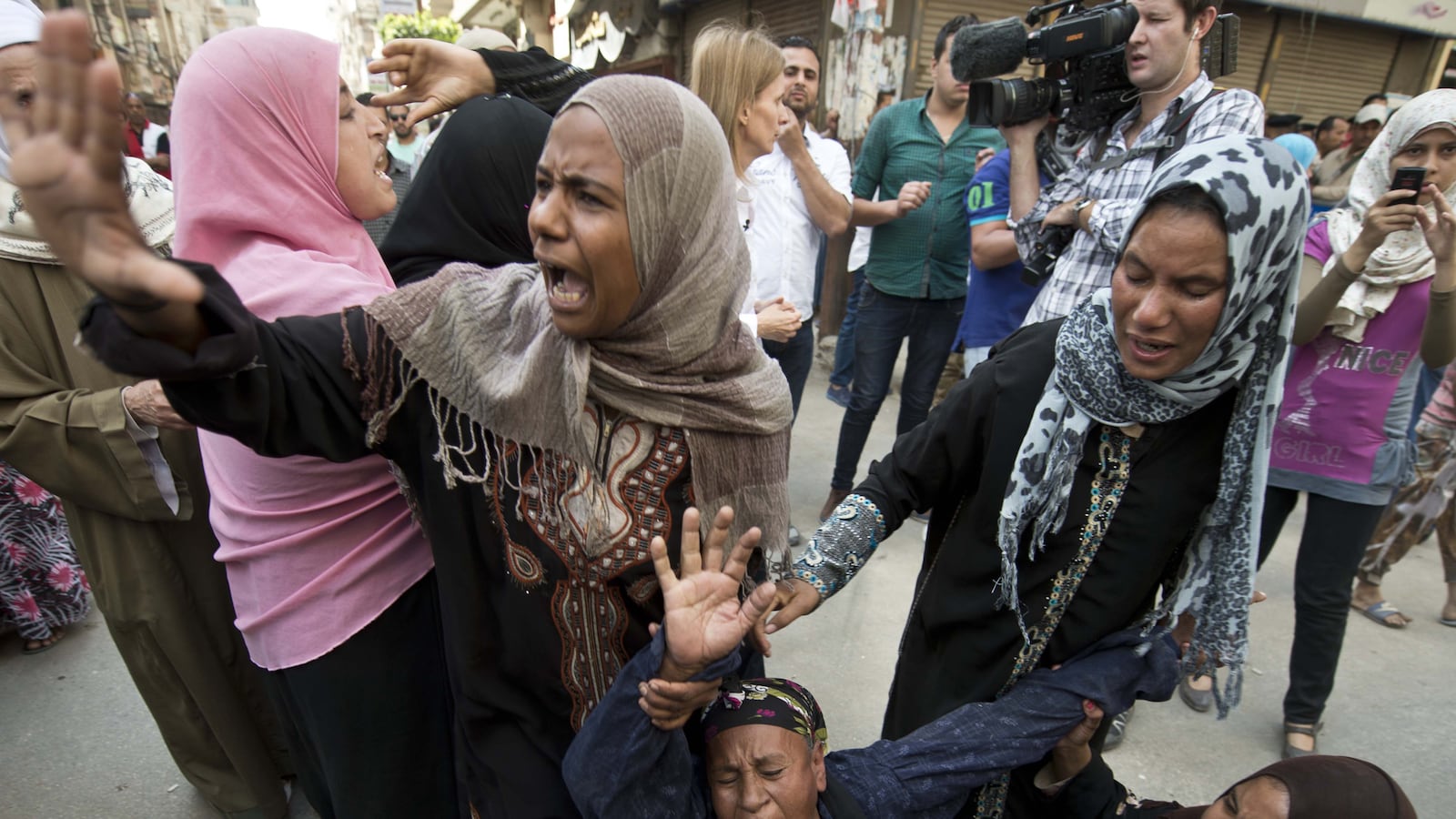MINYA, Egypt — He is nicknamed “The Butcher.” He is feared by all who enter his courtroom. And for good reason. In the last five weeks, Judge Saed Youssef, in Minya, Upper Egypt, has sentenced 1,212 people to their deaths in two mass trials.

Youssef’s latest verdict on Monday saw the Muslim Brotherhood Supreme Guide Mohamed Badie condemned to the gallows. He and 682 other defendants were handed the death penalty for allegedly killing a police officer and rioting last August during a retaliatory wave of violence after the security forces dispersed sit-ins for ousted Brotherhood President Mohamed Morsi.
In March, Youssef condemned 529 people to death, although most of those sentences subsequently were commuted to life in prison. If Monday’s ruling is carried out, Badie will be the most senior Brotherhood member to be executed since the Islamist group’s leader, Sayyid Qutb, was hanged in 1966.
The behavior of the judge has drawn international condemnation from rights groups, the United States and the European Union. Amnesty International dubbed his verdicts “grotesque,” while the United Nations human rights commissioner said the two trials were “rife with procedural irregularities.”
To say the least.
On Monday, baffled defense lawyers outside the heavily guarded Minya courtroom 250 kilometers south of Cairo told The Daily Beast the judge had refused to listen to witnesses or look at the evidence. “This is an insane act,” said Tarek Fouda, head of the Lawyers’ Syndicate in Minya, who filed a complaint against Youssef. “He has put his name in history: There was absolute absence of procedural justice in these trials.”
Judge Youssef first rose to prominence in 2012 when he took over the second district of the criminal court in his hometown of Beni Suef, some 100 kilometers north of Minya.
It was there he earned the nickname “The Butcher” for bending the law with his notoriously harsh verdicts: He once sentenced a man to 40 years in jail for possessing a gun. “He gave him 15 years for the weapon, 15 years for the bullets, then 10 years for getting into the gunfight,” said lawyer Mohamed El-Zanaty, based in Beni Suef, who has worked extensively in Youssef’s courtrooms.
But Youssef only gained international notoriety last year, when he acquitted the area’s security chief and 10 of his policemen accused of killing protesters on January 28, 2011, dubbed the “Friday of Rage,” one of the bloodiest moments of the 18-day uprising that overthrew President Hosni Mubarak.
El-Zanaty, who at the time was representing the families of dead demonstrators, said Youssef hadn’t given them the opportunity to plead their case. “Not even the lawyers of the police officers were allowed to defend them. He just freed them because he wanted to,” El-Zanaty told The Daily Beast.
In the first session of the police trial, which was covered extensively by local media, Youssef asked security to lock the courtroom. Again no item of evidence was presented, no eyewitnesses were cross-examined before he announced the verdict hearing.
Rumour has it in Minya that Youssef’s son, a police officer, was killed during the January Revolution. After that, it is said, he went haywire and has been on a one-man mission to jail or hang anyone opposed to the security forces and while acquitting all policemen. This could be Upper Egyptian legend. The Daily Beast could not verify it independently. But there is no question that Youssef is an angry man who lashes out in the courtroom.
When one of El-Zanaty’s colleagues dared argue that a policeman had fabricated a drugs report in court two years ago, Youssef put the lawyer in detention and accused him of insulting the security apparatus. In another incident, Youssef allegedly filed a complaint against an electrician, after he got stuck in the court’s elevator. The unsuspecting technician and his staff were accused of plotting to kill him, El-Zanaty said.
Youssef’s infamy has even reached his Wikipedia page in Arabic, which states that he once sentenced a man to 30 years in jail for stealing an abaya (a woman’s cloak) early last year.
After the Egyptian military overthrew President Morsi last summer, “The Butcher” was put in charge of the local “terrorist judicial district,” one of several regional courts set up across the country after the coup to manage cases in which the state allegedly had suffered attacks. Youssef now oversees Fayoum, Minya and Beni Suef.
His first verdict after this promotion was the one sentencing 529 people to death in March for allegedly killing a senior officer from the Matay police station, also in Minya. That trial lasted just one session.
It was only after local and international pressure and Egypt’s top Islamic official, the Grand Mufti, advised against the ruling that Youssef decided today to lighten the sentence for 492 defendants to life in prison. But he then sentenced 683 more to death in Badie’s case.
Ahmed Shabeeb from the Arab Center for Human Rights in Minya, who is representing the accused in both trials, said Youssef’s two latest rulings were spurred by his anger at the defense attorneys. In early March, they had asked that Youssef recuse himself, and that he be removed from the district, said Shabeeb, whose brother was a defendant in the case of the 529.
The judge screamed at the defense team, Shabeeb said, and then demanded the security forces surround the bench and train their guns on the lawyers. “He got angry and said next session would be the verdict,” said Shabeeb. “It has escalated from there.”
The lawyers boycotted the next hearing, backed by the local branch of Egypt’s Lawyers’ Syndicate. Shabeeb believes Monday’s second mass death verdict was Youssef getting his own back. “No legal procedure can be taken against this judge, there is nothing in Egyptian law. Even the president doesn’t have the right to fire a judge,“ Shabeeb said.
For the families involved in these cases the entire scene is a nightmare.
Relatives gathered outside the courtroom on Monday flanked by armed riot police officers, who pointed their guns nervously at the crowd. The moment the latest verdict was issued, the surrounding streets echoed with screams. Women fainted, men sobbed, while children in shock picked their way through the crowds of hysterical adults.
The defendants appeared to be a mix of Morsi supporters, bystanders picked up in random arrests, impoverished locals and even dead people.
“My brother Ibrahim died three years ago but his name is still in the case,” said Khadra Mahmoud Abdel-Hamid, in her 30s, sitting next to her elderly mother, who had collapsed. Every male member of Khadra’s family, including her dead brother, is now on death row, leaving the women destitute, she said.
“My brother Khaled works in a bakery around the corner from the clashes,” Fathiya Salah Zeidan told The Daily Beast. “They arrested him because he was wearing a mask, which he has to at work.”
The latest verdict has been referred to the Grand Mufti for his comment, although that is not legally binding and the judge can choose to ignore it.
Unless the judicial authorities decide to investigate Youssef, which they haven’t done yet, “The Butcher” will remain in charge. Meanwhile the Justice Ministry issued a statement maintaining the legality of proceedings, leaving the families, who have vowed to appeal the ruling, to fend for themselves.
“He didn’t read any of my papers, any of our evidence,” said Fathiya, clutching witness statements that she said prove her brother’s innocence. “I don’t know what to do, where to go. Khalid is my financial support, he is my everything.”





